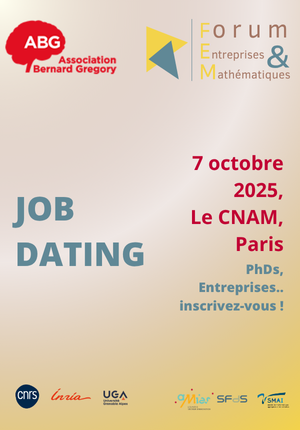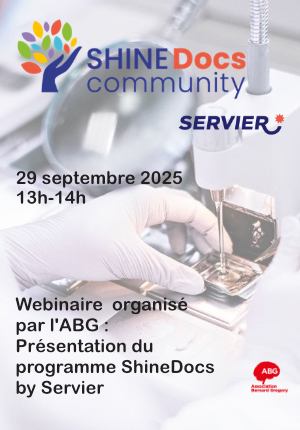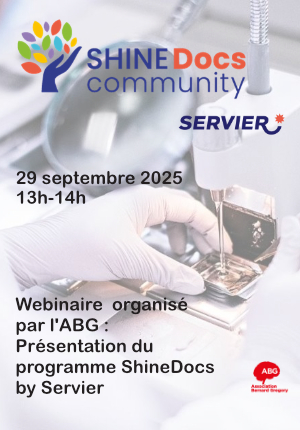AdaptiveMLOps (ANR TSIA 2024) // AdaptiveMLOps (ANR TSIA 2024)
|
ABG-132714
ADUM-66632 |
Thesis topic | |
| 2025-06-28 | Other public funding |
IMT MINES ALES
Montpellier - Occitanie - France
AdaptiveMLOps (ANR TSIA 2024) // AdaptiveMLOps (ANR TSIA 2024)
- Computer science
Génie Logiciel, Intelligence Artificielle, MLOps/DevOps, Variabilité statique et dynamique, Ingénierie de lignes de produits logiciels, Ingénierie dirigée par les modèles
Software Engineering, Artificial Intelligence, MLOps/DevOps, Static and dynamic variability, Software product line engineering, Model-driven engineering
Software Engineering, Artificial Intelligence, MLOps/DevOps, Static and dynamic variability, Software product line engineering, Model-driven engineering
Topic description
L'utilisation des modèles d'IA est appelée à se généraliser dans la réalisation des applications. Mais ils doivent pour cela être rendus pleinement opérationnalisables, c'est-à-dire transformés en composants logiciels répondant aux exigences fonctionnelles et de qualité des environnements de développement, de qualification et d'exécution. Cet objectif nécessite l'adaptation des méthodes de gestion et d'automatisation des chaînes de production logicielles, le DevOps, pour y intégrer les concepts, stratégies et bonnes pratiques nécessaires au développement, déploiement, monitoring et maintenance continus des modèles d'IA, le MLOps.
Pour préserver la philosophie DevOps, qui abolit la frontière entre les phases de développement et d'opérations, le MLOps doit faciliter les collaborations entre les ingénieurs Data, IA et Logiciels au sein des projets et les assister dans la maîtrise des multiples composantes nécessaires à la mise au point et à la mise en œuvre des modèles d'IA (data, ML, logiciel, opérations). Une solution no-code / low code serait adaptée à la multiplicité des profils des contributeurs, qui doivent manipuler des concepts éloignés leurs domaines d'expertise. Mais sa conception se heurte à la diversité et à la variabilité des éléments constituant les pipelines de MLOps.
L'objectif du projet ANR AdaptiveMLOps est d'étudier l'application d'approches d'ingénierie de lignes de produits pour cataloguer les éléments récurrents des pipelines de MLOps et documenter leur variabilité statique et dynamique. La connaissance métier ainsi recueillie et formalisée permettra de guider et d'assister la conception de pipelines de MLOps par réutilisation, composition et configuration. Elle sera mise en œuvre par une approche d'ingénierie dirigée par les modèles qui proposera un DSL :
i) générique et extensible, pour couvrir la variété des éléments des pipelines et l'évolution des pratiques de MLOps,
ii) abstrait, pour être facilement utilisable sans expertise,
iv) pivot, pour permettre des transformations vers les langages de Plateform / Infrastructure as Code utilisés dans les déploiements,
iii) gérant la variabilité statique et dynamique, pour ne pas limiter personnalisation, fine-tuning et adaptation dynamique.
AdaptiveMLOps vise en particulier la gestion automatique et dynamique du (re)-déploiement chez des fournisseurs multiples de différentes portions du pipeline et des composants d'IA associés afin d'optimiser les performances, le coût et l'empreinte environnementale. L'ensemble des solutions sera prototypé et validé au travers de PoC en utilisant la plateforme du partenaire industriel du projet (fournisseur de solutions cloud) sur des cas d'études concrets fournis par les clients du partenaire industriel du projet (grands groupes français).
------------------------------------------------------------------------------------------------------------------------------------------------------------------------
------------------------------------------------------------------------------------------------------------------------------------------------------------------------
The use of AI models is poised to become mainstream in application development. To achieve this, AI code must be fully operationalized, that is, transformed into robust software components that meet both functional and quality requirements for deployment and execution across development, testing, and production environments. This objective requires adapting or extending the software production management and automation frameworks provided by DevOps infrastructures. Specifically, it involves incorporating the principles, strategies, and best practices of MLOps, which are dedicated to the continuous development, deployment, monitoring, and maintenance of AI models.
To preserve the DevOps philosophy—which removes the barrier between development and operations phases—MLOps must enable collaboration between Data, AI, and Software engineers within projects, or assist them in mastering the many domain-specific components required for the design and deployment of AI models. A no-code / low-code solution would be well-suited to the diverse profiles of contributors, who must work with concepts far from their areas of expertise. However, designing such a solution is challenged by the diversity and variability of the components that make up MLOps pipelines.
The goal of the ANR AdaptiveMLOps project is to explore the application of product line engineering approaches to catalog the recurring elements of MLOps pipelines and document their static and dynamic variability. The domain knowledge thus collected and formalized will help guide and support the design of MLOps pipelines through reuse, composition, and configuration. It will be implemented using a model-driven engineering approach that will propose a DSL (Domain-Specific Language) that is:
i) generic and extensible, to cover the variety of pipeline components and the evolution of MLOps practices,
ii) abstract, to be easily usable without requiring specific expertise,
iii) pivotal, to enable transformations into Platform / Infrastructure as Code languages used in deployments,
iv) capable of handling static and dynamic variability, so as not to limit customization, fine-tuning, or dynamic adaptation.
AdaptiveMLOps specifically targets the automatic and dynamic management of (re)deployment across multiple providers of different parts of the pipeline and the associated AI components, to optimize performance, cost, and environmental footprint. All solutions will be prototyped and validated through proofs of concept (PoCs), using the industrial partner's platform (a cloud solutions provider), based on real-world use cases provided by the industrial partner's clients (major French corporations).
------------------------------------------------------------------------------------------------------------------------------------------------------------------------
------------------------------------------------------------------------------------------------------------------------------------------------------------------------
Début de la thèse : 01/10/2025
WEB : https://adaptivemlops.wp.imt.fr/hiring/
Pour préserver la philosophie DevOps, qui abolit la frontière entre les phases de développement et d'opérations, le MLOps doit faciliter les collaborations entre les ingénieurs Data, IA et Logiciels au sein des projets et les assister dans la maîtrise des multiples composantes nécessaires à la mise au point et à la mise en œuvre des modèles d'IA (data, ML, logiciel, opérations). Une solution no-code / low code serait adaptée à la multiplicité des profils des contributeurs, qui doivent manipuler des concepts éloignés leurs domaines d'expertise. Mais sa conception se heurte à la diversité et à la variabilité des éléments constituant les pipelines de MLOps.
L'objectif du projet ANR AdaptiveMLOps est d'étudier l'application d'approches d'ingénierie de lignes de produits pour cataloguer les éléments récurrents des pipelines de MLOps et documenter leur variabilité statique et dynamique. La connaissance métier ainsi recueillie et formalisée permettra de guider et d'assister la conception de pipelines de MLOps par réutilisation, composition et configuration. Elle sera mise en œuvre par une approche d'ingénierie dirigée par les modèles qui proposera un DSL :
i) générique et extensible, pour couvrir la variété des éléments des pipelines et l'évolution des pratiques de MLOps,
ii) abstrait, pour être facilement utilisable sans expertise,
iv) pivot, pour permettre des transformations vers les langages de Plateform / Infrastructure as Code utilisés dans les déploiements,
iii) gérant la variabilité statique et dynamique, pour ne pas limiter personnalisation, fine-tuning et adaptation dynamique.
AdaptiveMLOps vise en particulier la gestion automatique et dynamique du (re)-déploiement chez des fournisseurs multiples de différentes portions du pipeline et des composants d'IA associés afin d'optimiser les performances, le coût et l'empreinte environnementale. L'ensemble des solutions sera prototypé et validé au travers de PoC en utilisant la plateforme du partenaire industriel du projet (fournisseur de solutions cloud) sur des cas d'études concrets fournis par les clients du partenaire industriel du projet (grands groupes français).
------------------------------------------------------------------------------------------------------------------------------------------------------------------------
------------------------------------------------------------------------------------------------------------------------------------------------------------------------
The use of AI models is poised to become mainstream in application development. To achieve this, AI code must be fully operationalized, that is, transformed into robust software components that meet both functional and quality requirements for deployment and execution across development, testing, and production environments. This objective requires adapting or extending the software production management and automation frameworks provided by DevOps infrastructures. Specifically, it involves incorporating the principles, strategies, and best practices of MLOps, which are dedicated to the continuous development, deployment, monitoring, and maintenance of AI models.
To preserve the DevOps philosophy—which removes the barrier between development and operations phases—MLOps must enable collaboration between Data, AI, and Software engineers within projects, or assist them in mastering the many domain-specific components required for the design and deployment of AI models. A no-code / low-code solution would be well-suited to the diverse profiles of contributors, who must work with concepts far from their areas of expertise. However, designing such a solution is challenged by the diversity and variability of the components that make up MLOps pipelines.
The goal of the ANR AdaptiveMLOps project is to explore the application of product line engineering approaches to catalog the recurring elements of MLOps pipelines and document their static and dynamic variability. The domain knowledge thus collected and formalized will help guide and support the design of MLOps pipelines through reuse, composition, and configuration. It will be implemented using a model-driven engineering approach that will propose a DSL (Domain-Specific Language) that is:
i) generic and extensible, to cover the variety of pipeline components and the evolution of MLOps practices,
ii) abstract, to be easily usable without requiring specific expertise,
iii) pivotal, to enable transformations into Platform / Infrastructure as Code languages used in deployments,
iv) capable of handling static and dynamic variability, so as not to limit customization, fine-tuning, or dynamic adaptation.
AdaptiveMLOps specifically targets the automatic and dynamic management of (re)deployment across multiple providers of different parts of the pipeline and the associated AI components, to optimize performance, cost, and environmental footprint. All solutions will be prototyped and validated through proofs of concept (PoCs), using the industrial partner's platform (a cloud solutions provider), based on real-world use cases provided by the industrial partner's clients (major French corporations).
------------------------------------------------------------------------------------------------------------------------------------------------------------------------
------------------------------------------------------------------------------------------------------------------------------------------------------------------------
Début de la thèse : 01/10/2025
WEB : https://adaptivemlops.wp.imt.fr/hiring/
Funding category
Other public funding
Funding further details
ANR Financement d'Agences de financement de la recherche
Presentation of host institution and host laboratory
IMT MINES ALES
Institution awarding doctoral degree
IMT MINES ALES
Graduate school
166 I2S - Information, Structures, Systèmes
Candidate's profile
Nous recherchons des candidats ayant suivi un cursus de niveau master 2 en génie logiciel, avec des compétences / expériences en ingénierie dirigée par les modèles, en ingénierie de lignes de produits, sur les concepts et les outils de DevOps / MLOps, le développement et la gestion d'architectures logicielles, la variabilité statique et dynamique des architectures logicielles, l'adaptation autonomique d'architectures logicielles. Des compétences / expériences en Intelligence Artificielle, ou sur les combinaisons génie logiciel / intelligence artificielles seraient un avantage. Une expérience de la recherche (stage, missions, projets) serait également appréciée. Une bonne maîtrise de l'anglais, en particulier écrite, est requise.
We are looking for candidates who have completed a Master 2 program in software engineering, with skills and/or experience in model-driven engineering, product line engineering, DevOps/MLOps, Software architecture development and management, Static and dynamic variability of software architectures, Autonomic adaptation of software architectures. Skills and/or experience in Artificial Intelligence, or in combining software engineering with artificial intelligence, would be an asset. Research experience (internships, assignments, projects) would also be appreciated. A good English proficiency, particularly in writing, is required.
We are looking for candidates who have completed a Master 2 program in software engineering, with skills and/or experience in model-driven engineering, product line engineering, DevOps/MLOps, Software architecture development and management, Static and dynamic variability of software architectures, Autonomic adaptation of software architectures. Skills and/or experience in Artificial Intelligence, or in combining software engineering with artificial intelligence, would be an asset. Research experience (internships, assignments, projects) would also be appreciated. A good English proficiency, particularly in writing, is required.
2025-09-30
Apply
Close
Vous avez déjà un compte ?
Nouvel utilisateur ?
More information about ABG?
Get ABG’s monthly newsletters including news, job offers, grants & fellowships and a selection of relevant events…
Discover our members
 MabDesign
MabDesign  ADEME
ADEME  TotalEnergies
TotalEnergies  PhDOOC
PhDOOC  Tecknowmetrix
Tecknowmetrix  Aérocentre, Pôle d'excellence régional
Aérocentre, Pôle d'excellence régional  Généthon
Généthon  Ifremer
Ifremer  ASNR - Autorité de sûreté nucléaire et de radioprotection - Siège
ASNR - Autorité de sûreté nucléaire et de radioprotection - Siège  ONERA - The French Aerospace Lab
ONERA - The French Aerospace Lab  CASDEN
CASDEN  MabDesign
MabDesign  ANRT
ANRT  SUEZ
SUEZ  CESI
CESI  Laboratoire National de Métrologie et d'Essais - LNE
Laboratoire National de Métrologie et d'Essais - LNE  Institut Sup'biotech de Paris
Institut Sup'biotech de Paris  Nokia Bell Labs France
Nokia Bell Labs France  Groupe AFNOR - Association française de normalisation
Groupe AFNOR - Association française de normalisation




